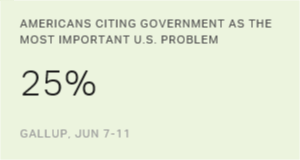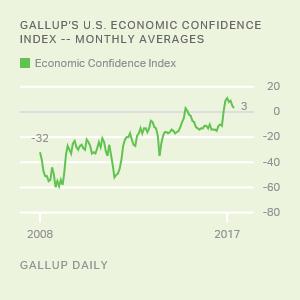Story Highlights
- 63% of Americans say Democrats handle the environment better
- Democrats are also favored on minority rights, healthcare and education
- Republicans receive highest marks on national security and federal debt
WASHINGTON, D.C. -- Americans believe the Democratic Party is better at handling the environment, racial discrimination, healthcare and education. The Republican Party is credited with doing a better job on national defense, federal debt and terrorism. On many other issues, including the economy, foreign trade and taxes, Americans are divided on which party is better at handling them.
| Democratic Party | Republican Party | Advantage | |||||||||||||||||||||||||||||||||||||||||||||||||||||||||||||||||||||||||||||||||||||||||||||||||
|---|---|---|---|---|---|---|---|---|---|---|---|---|---|---|---|---|---|---|---|---|---|---|---|---|---|---|---|---|---|---|---|---|---|---|---|---|---|---|---|---|---|---|---|---|---|---|---|---|---|---|---|---|---|---|---|---|---|---|---|---|---|---|---|---|---|---|---|---|---|---|---|---|---|---|---|---|---|---|---|---|---|---|---|---|---|---|---|---|---|---|---|---|---|---|---|---|---|---|---|
| % | % | pct. pts. | |||||||||||||||||||||||||||||||||||||||||||||||||||||||||||||||||||||||||||||||||||||||||||||||||
| The environment, including global warming | 63 | 29 | D, +34 | ||||||||||||||||||||||||||||||||||||||||||||||||||||||||||||||||||||||||||||||||||||||||||||||||
| Discrimination against minority groups | 59 | 30 | D, +29 | ||||||||||||||||||||||||||||||||||||||||||||||||||||||||||||||||||||||||||||||||||||||||||||||||
| Healthcare policy | 55 | 36 | D, +19 | ||||||||||||||||||||||||||||||||||||||||||||||||||||||||||||||||||||||||||||||||||||||||||||||||
| Education | 54 | 35 | D, +19 | ||||||||||||||||||||||||||||||||||||||||||||||||||||||||||||||||||||||||||||||||||||||||||||||||
| The size and power of large corporations | 46 | 38 | D, +8 | ||||||||||||||||||||||||||||||||||||||||||||||||||||||||||||||||||||||||||||||||||||||||||||||||
| Unemployment | 48 | 42 | D, +6 | ||||||||||||||||||||||||||||||||||||||||||||||||||||||||||||||||||||||||||||||||||||||||||||||||
| Tax policy | 45 | 43 | D, +2 | ||||||||||||||||||||||||||||||||||||||||||||||||||||||||||||||||||||||||||||||||||||||||||||||||
| Foreign trade | 45 | 44 | D, +1 | ||||||||||||||||||||||||||||||||||||||||||||||||||||||||||||||||||||||||||||||||||||||||||||||||
| The economy | 44 | 45 | R, +1 | ||||||||||||||||||||||||||||||||||||||||||||||||||||||||||||||||||||||||||||||||||||||||||||||||
| The size and power of the federal government | 41 | 45 | R, +4 | ||||||||||||||||||||||||||||||||||||||||||||||||||||||||||||||||||||||||||||||||||||||||||||||||
| Gun policy | 43 | 47 | R, +4 | ||||||||||||||||||||||||||||||||||||||||||||||||||||||||||||||||||||||||||||||||||||||||||||||||
| Illegal immigration | 42 | 49 | R, +7 | ||||||||||||||||||||||||||||||||||||||||||||||||||||||||||||||||||||||||||||||||||||||||||||||||
| Terrorism | 38 | 48 | R, +10 | ||||||||||||||||||||||||||||||||||||||||||||||||||||||||||||||||||||||||||||||||||||||||||||||||
| Federal government debt | 35 | 49 | R, +14 | ||||||||||||||||||||||||||||||||||||||||||||||||||||||||||||||||||||||||||||||||||||||||||||||||
| National defense and the military | 35 | 57 | R, +22 | ||||||||||||||||||||||||||||||||||||||||||||||||||||||||||||||||||||||||||||||||||||||||||||||||
| Â鶹´«Ã½AV, June 7-11, 2017 | |||||||||||||||||||||||||||||||||||||||||||||||||||||||||||||||||||||||||||||||||||||||||||||||||||
These data come from a June 7-11 Â鶹´«Ã½AV poll in which 50% of respondents identified with or leaned to the Democratic Party, and 43% identified with or leaned to the Republican Party overall, a seven-percentage-point gap.
Democrats receive their highest ratings on handling the environment and discrimination against minority groups. More than six in 10 Americans say Democrats would do a better job of handling the environment, compared with 29% who favor the Republicans on this issue. While 59% say Democrats would better handle discrimination against minority groups, 30% say Republicans would. Democrats also have the advantage on handling healthcare policy and education, each by a 19-point margin.
Republicans' largest margin on any issue tested in the survey is 22 points on the military and national defense: 57% of Americans say the Republicans would better handle the issue, as opposed to 35% who say the Democrats would. Republicans also enjoy double-digit advantages on the federal government debt (49% to 35%) and terrorism (48% to 38%).
While there are many issues on which Americans favor one party over the other, in several important areas there is no consensus. On the economy, Americans are about evenly split, with 45% saying Republicans would better handle the issue and 44% saying Democrats would. Americans are also divided on foreign trade, with 45% favoring Democrats and 44% Republicans.
Americans' Perceptions of Party Strengths Little Changed From 2010
Americans' attitudes on which party can better handle problems have changed relatively little since the question was last asked, in May 2010. The largest difference -- a five-point increase -- occurred in the percentage of Americans who believe Democrats are better able to handle the environment. Americans' view that Democrats would better handle government debt fell four points, while the percentage who favor Republicans to handle illegal immigration increased by an equal amount.
Overall, this lack of change suggests Americans have fixed stereotypes about Democrats and Republicans.
| Dem. Party, 2010 | Dem. Party, 2017 | Difference, Dem. Party | Repub. Party, 2010 | Repub. Party, 2017 | Difference, GOP | ||||||||||||||||||||||||||||||||||||||||||||||||||||||||||||||||||||||||||||||||||||||||||||||
|---|---|---|---|---|---|---|---|---|---|---|---|---|---|---|---|---|---|---|---|---|---|---|---|---|---|---|---|---|---|---|---|---|---|---|---|---|---|---|---|---|---|---|---|---|---|---|---|---|---|---|---|---|---|---|---|---|---|---|---|---|---|---|---|---|---|---|---|---|---|---|---|---|---|---|---|---|---|---|---|---|---|---|---|---|---|---|---|---|---|---|---|---|---|---|---|---|---|---|---|
| % | % | pct. pts. | % | % | pct. pts. | ||||||||||||||||||||||||||||||||||||||||||||||||||||||||||||||||||||||||||||||||||||||||||||||
| The environment, including global warming | 58 | 63 | +5 | 28 | 29 | +1 | |||||||||||||||||||||||||||||||||||||||||||||||||||||||||||||||||||||||||||||||||||||||||||||
| Discrimination against minority groups | 57 | 59 | +2 | 28 | 30 | +2 | |||||||||||||||||||||||||||||||||||||||||||||||||||||||||||||||||||||||||||||||||||||||||||||
| The size and power of large corporations | 48 | 46 | -2 | 37 | 38 | +1 | |||||||||||||||||||||||||||||||||||||||||||||||||||||||||||||||||||||||||||||||||||||||||||||
| Unemployment | 48 | 48 | -- | 40 | 42 | +2 | |||||||||||||||||||||||||||||||||||||||||||||||||||||||||||||||||||||||||||||||||||||||||||||
| The size and power of the federal government | 37 | 41 | +4 | 48 | 45 | -3 | |||||||||||||||||||||||||||||||||||||||||||||||||||||||||||||||||||||||||||||||||||||||||||||
| Illegal immigration | 40 | 42 | +2 | 45 | 49 | +4 | |||||||||||||||||||||||||||||||||||||||||||||||||||||||||||||||||||||||||||||||||||||||||||||
| Terrorism | 36 | 38 | +2 | 49 | 48 | -1 | |||||||||||||||||||||||||||||||||||||||||||||||||||||||||||||||||||||||||||||||||||||||||||||
| Federal government debt | 39 | 35 | -4 | 46 | 49 | +3 | |||||||||||||||||||||||||||||||||||||||||||||||||||||||||||||||||||||||||||||||||||||||||||||
| Fewer issues were included in the May 2010 survey compared with the June 2017 survey | |||||||||||||||||||||||||||||||||||||||||||||||||||||||||||||||||||||||||||||||||||||||||||||||||||
| Â鶹´«Ã½AV | |||||||||||||||||||||||||||||||||||||||||||||||||||||||||||||||||||||||||||||||||||||||||||||||||||
During Donald Trump's presidential campaign and into his presidency, he has largely played to Republican strengths. Trump earns his , an issue that Americans, by 10 points, say Republicans handle better. Alternatively, he receives some of his lowest approval ratings on issues Americans say Democrats handle better. Less than a third approve of , an issue Democrats are favored to handle by 34 points.
Political leaders who emphasize issues that are core party strengths and pay little attention to party weaknesses may satisfy their base of supporters but risk potentially alienating other Americans. Trump's 84% approval rate among Republicans indicates he has mostly held the support of his base, at least partially because of his emphasis on national security and economic issues. However, his 6% approval rating among Democrats and for the week ending June 18 demonstrate the risks of this approach.
Bottom Line
With the recent release of the Senate's version of a bill to repeal the Affordable Care Act (ACA), Democrats -- who control neither Congress nor the presidency -- now have an opportunity to capitalize on Americans' perceptions that they are better at handling healthcare policy as they attempt to defeat the GOP legislation and preserve Obamacare. Democrats' 19-point advantage on healthcare underscores the difficulty Republicans might have in convincing Americans to support their legislation.
Americans place considerable importance on healthcare policy and name the facing their families. The issue's importance, as well as Americans' belief that the Democratic Party is better at dealing with it, will offer the party an opportunity to generate political capital throughout what is likely to be a lengthy, uphill battle to fulfill the GOP's seven-year promise to repeal the ACA.
Historical data are available in .
Survey Methods
Results for this Â鶹´«Ã½AV poll are based on telephone interviews conducted June 7-11, 2017, with random samples of between 668 and 706 adults, aged 18 and older, living in all 50 U.S. states and the District of Columbia. For results based on these samples of national adults, the margin of sampling error is ±5 percentage points at the 95% confidence level. All reported margins of sampling error include computed design effects for weighting.
Each sample of national adults includes a minimum quota of 70% cellphone respondents and 30% landline respondents, with additional minimum quotas by time zone within region. Landline and cellular telephone numbers are selected using random-digit-dial methods.
View survey methodology, complete question responses and trends.
Learn more about how the works.



